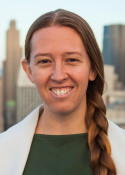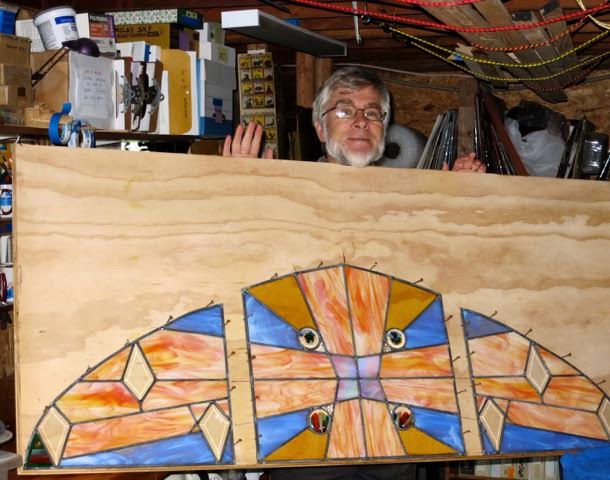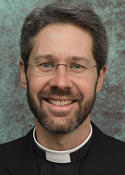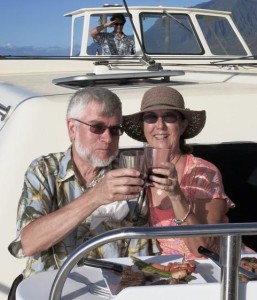From the rector
Remembering
We are now on the other side of another Holy Week. From the palms, to the table, to the cross, and the startlingly empty tomb. Every time we do this I come away amazed. Amazed at the visceral power of walking through Holy Week and the Triduum. That when we give ourselves over to these days to come close to the Holy, we are changed.
It really does surprise me every time. Yes, I know it’s coming, we devote hours upon hours of planning and preparation—sacristans, musicians, acolytes, preachers. We rehearse music and actions, we polish brass, and we pick rose petals. We pore over bulletins and we immerse in scriptural study. In all, we set aside time and we create space, especially in ourselves, so that we can have an encounter. And every year, because of, or maybe in spite of this intensive preparation, I am stunned by what takes place in the walking of this week.
This year was no different. On Thursday it was the foot washing at the noon service, watching two of our pre-schoolers wash people’s feet, with such tremendous care and attention. On Friday it was watching as people came to the cross, offering the tokens of petals, but, really, offering themselves as they came close to Jesus. On Saturday it was the kindling of fire in the darkness, and the explosion of light and sound at the proclamation of the Resurrection. It was in those active re-tellings that this ancient story was made alive again.
I was reminded that there is something about the ritual action that makes these encounters possible. Something about the re-enactment, the stories and the songs and the silence all surrounding and suffusing the actions that makes it real and present. And in that remembering, I realized that this may be part of why Easter Sunday feels different.
Because on Sunday morning there is no visit to an empty tomb, we don’t have a ritual associated with the day of the Resurrection in the same way that we do for the other days.
Except that in a way, we do. It’s just that we don’t always encounter it that way.
Many years ago, I was able to take part in Prof. Louis Weil’s class on Anglican Theology of the Eucharist. And one of the more formational moments of the course for me was how we began. Louis started by reading from Luke’s Gospel, from the middle of chapter 24, about the day of the Resurrection. And then he read these words,
“As they came near the village to which they were going, he walked ahead as if he were going on. But they urged him strongly, saying, ‘Stay with us, because it is almost evening and the day is now nearly over.’ So he went in to stay with them. When he was at the table with them, he took bread, blessed and broke it, and gave it to them. Then their eyes were opened, and they recognized him; and he vanished from their sight.”
This story, offered Louis, is likely the first experience of what we know as the Eucharist. Yes, the early church memorialized the Last Supper, when Jesus sat at table and with words and actions and taught his disciples how to follow him. But that was before the Resurrection. This encounter in Emmaus is the first recorded story we have of a meal where followers of Jesus had bread—broken, blessed and shared. And somehow, Jesus was among them. And it can be our Easter re-membering, with story and ritual action.
It could be that because we remember this action so often, every Sunday and during the week as well, that we in fact forget to create the space for this encounter. Or, that we miss this moment because we never tell this story on Easter Sunday, we stop with the disciples being amazed from the empty tomb.
What I am sure of, though, is that every time we come together around the table, telling the story of Jesus with his friends, with bread and wine, we have to make ourselves ready, to create the space in ourselves. Every time we share this meal we have the opportunity to recognize Jesus within us, among us, in the breaking of the bread.
Peace,
Phil+
Holy reflections from a holy week
 On Good Friday afternoon, seven wise and brave members of All Souls shared how their own stories intertwined with Jesus’ last words. Today and in coming weeks, we will be offering some of those reflections, with gratitude.
On Good Friday afternoon, seven wise and brave members of All Souls shared how their own stories intertwined with Jesus’ last words. Today and in coming weeks, we will be offering some of those reflections, with gratitude.
“Today you will be with me in paradise.” – Luke 23:43
How to Survive the Fall
Remind me friends,
of even darker days
from which hope sprang.
For today we mourn.
Dull and mute,
our hands made still at last by heavy grieving.
There are no flowers here.
No victors’ wreaths,
no promises of hope
to keep ourselves from failing.
The war is hard and long,
our enemy well-armed and unafraid.
The best of our loved ones have fallen,
and eulogies sound like they do
because death creeps into powerful places
and always knows who to find.
It hunts us into solitary corners
and would have us believe
after loss and loss and loss
that we are alone.
Last time,
in an effort not to lose myself,
I called a friend whose heart I could not hurt,
who has held death’s hands already across tall mountains,
and he said to me,
Go home.
Return to the souls who grieve like yours,
whose suffering sings harmony with your own.
The world has born this all before.
We walk among the hearers of voices,
the desperate prayers, the shot, the frayed, the keening –
and there is nothing yet that someone has not survived.
And we are each other.
So if you have never felt what it is like to cross a river,
ten thousand tons of water crushing chest and feet,
then I will hold that memory for you.
And when you say you feel like you can’t keep breathing,
I will know exactly what you mean.
We all know what it feels like to be drowning.
Remind me then.
Remind me of the days I did not die.
We have weathered fiercer storms,
we have broken thicker chains than these.
Our ancestors toppled higher walls
and fiercer tyrant kings,
and once God flooded the whole blue world and they kept on going.
We are here
in testament together
to their memory.
Remind us then.
Revive the legends of our heroes,
sing me songs about Mandela,
preach me sermons about Christ and King,
tell me how you
impossibly
made it
to this day
standing.
We have come this far
and this far is a miracle,
you are all a miracle.
And you can promise me
that one day soon we will arrive.
Our feet weary with marching.
Promise me the others will keep coming.
We are nothing without each other.
We are nothing but each other.
And the person next to you
breathing
is hope
risen straight up out of concrete,
tree grown from a rock to split the sky
and break our burning hearts
wide open.
I wrote that piece during a season of Good Fridays, in the fall of 2014. A good friend had killed himself. We had worked together for years as organizers in his affordable housing building, and he was one of those people who knew and loved and took care of hundreds of people. His death tore a huge gash through the center of our community. It turned out he would be the first of several of our tenants to die in the space of a few short weeks. Two killed themselves after long and publicly hard-fought battles with psychosis and depression.
We were reeling. We were angry and grieving and our tenants were angry and grieving, and it was our job to somehow try to hold it all together. We wept at home and then came to work. But we were wretched and struggling and destroyed by the ghosts of all the things we hadn’t done. As clinical staff, it had been our job to help them. We wept at home, then came to work to try and hold people together. Tenants started avoiding our office, afraid of getting bad news. I daydreamed about not going in, about trying to pretend that I wasn’t bound up in all that suffering that I couldn’t fix, all that failure and loss I couldn’t save anyone from, least of all myself.
In the middle of that season, I admitted someone to a psychiatric hospital for the first time. In the middle of some routine paperwork, a tenant told me she was planning to die. She showed me the pill bottles stashed in her purse. None of us were taking any chances at that point, so we went to the hospital together.
Admission took eight hours. Waiting for intake, we played a lot of tic tac toe and she named her favorite blues musicians for me to play from my phone while she danced a little in her chair. When we heard someone screaming from another room, she said she wanted to leave. She didn’t think she was crazy. She felt alone and scared and was tired of crying all the time.
But we were there. There was nothing I could do, no going back, no fixing anything. Just waiting.
So I played music and sat with her. I broke all the rules of social work and told her I knew. That I know what it’s like to want to die, to spend all day, every day, making desperate plans to escape. To feel utterly without hope and utterly alone. I held her hands. We can’t make promises that others will be okay. I wasn’t okay. I couldn’t fix things, couldn’t heal her hurt. I could just be present to her sorrow. I could try to be a little less desperate to leave places of pain so I didn’t leave people behind the people who were trapped there.
Christ on the cross is surrounded, as always, by undesirable people. Criminals, the sick, the insane. People who suffer and remind us of our suffering, the people we like to forget, people we avoid. And Christ, this miracle worker –healer of the sick, walker on water, raiser of the dead – he doesn’t save anybody. He doesn’t save the thief, he doesn’t save himself. He looks at the condemned person beside him and says, I can remember you. I can be with you. And together, today, we can be in the presence of God.
We have come this far, and this far is a miracle. You are all a miracle. And you can promise me, that one day soon we will arrive.
– Laura Eberly
CROP Hunger Walk
 Many of you know that I’ve been involved in the work of food justice and issues concerning homelessness for some time. Providing food to those in need was important to Jesus as evidenced by the feeding of the multitude. This is one reason I’m involved with the CROP Hunger Walk.
Many of you know that I’ve been involved in the work of food justice and issues concerning homelessness for some time. Providing food to those in need was important to Jesus as evidenced by the feeding of the multitude. This is one reason I’m involved with the CROP Hunger Walk.
Unfortunately, there are people in our midst who lack adequate access to food. According to the quadrennial “Hunger in America” study, 1 in 5 Alameda County residents receive help from the Alameda County Community Food Bank. The study also reports “residents are forced to make increasingly difficult decisions, just to get by:
- 52 percent of client households chose between paying for food and medicine/medical care in the last year
- 46 percent chose between paying for food and rent
- 63 percent used coping strategies – such as eating expired food or watering down items to make them last longer – to ensure they had enough food to eat.”
This year, the annual Berkeley CROP Hunger Walk will take place on April 17, 2016. The purpose of the walk is twofold: raise awareness of hunger issues in our community, and to support the global relief and hunger work of CWS Global (formerly known as Church World Services). Four local organizations who help to provide food to those in need, will benefit from a portion of the total money raised in Berkeley. The organizations are YEAH!, Youth Spirit Art Works, Berkeley Food Pantry, and Dorothy Day House. These organizations will share 25% of total money raised during the walk.
I’m asking you to to do two things: 1) Please donate to the CROP Hunger Walk. You can join the All Souls team here. There you will find a Donate button that will enable you electronically donate to the Walk.
And 2) Walk. Join the walk on April 17. I encourage you to join other Berkeley churches and organizations on April 17, and walk with them. Let others know that we want to help end hunger in our community, one step at a time. Registration and music begins at 1:00 pm. The walk begins at 1:30 pm.
– Stephen Southern
Welcoming New Members
Jim and Joni Stickney have been official members since the beginning of 2016, but have attended All Souls off and on for years. Jim is a retired Episcopal priest and Joni worked for many years for PG&E, first as a chemist, then in other energy procurement positions, finally retiring as an analyst for energy storage sources.
Neither Jim nor Joni are “fully retired.” Joni works as a contractor for specific projects at her old job, and Jim substitutes on Sundays as requested. In 2015 a church in Kauai asked Jim to serve for ten weeks, and in 2016 he and Joni will again live in their vicarage while he serves several weeks during the Easter season.
Joni is a certified Master Gardener (through the UC Cooperative Extension) and is currently focusing her efforts through FORGE (Friends of the Richmond Greenway). Jim is a stained glass artisan (including smaller decorative projects for the home), and his larger work can be seen at the parish hall of St. Alban’s Church in Albany, where he was rector for 20 years. They both enjoy seeing some friends from St. Alban’s here at All Souls. For instance, Jim had the privilege of baptizing Andrew and Phoebe Dixon (as infants). Betsy used to work at PG&E, so Joni and Betsy have much in common from work world. Steve Dixon recently worked with Jim on stained glass windows for their home, and Jim is learning about framing techniques, thanks to Steve’s carpentry skills.
Because of grandchildren visits and Sundays spent at other churches, you’ll see us rather infrequently, most often at 9:00. We’re delighted to be among the new members of All Souls, and even when we’re not here in person, we keep this community in our prayers.

Jim’s studio and the window for St. Alban’s
Family Gathering and Potluck
April 23rd, 4:30 pm, at the Koops-Elsons’ house
Parents, kids and youth, come enjoy each other’s company! We’ll have the grill fired up if you want to to throw something on, or bring other food or bevs to share. The goal is fun, not fancy. Bring your kids and youth (they’ll be excited about the massive rope swing and tree house!) and have a relaxed evening connecting with All Soulsian parents. If you have parent friends who are interested in All Souls but wary of going to church, invite them! Please email Liz or Jeannie to RSVP and to get directions, and/or add what you plan to bring to this google doc.
Equipping the Beloved Community
St. Paul’s, Burlingame will be your host for the learning-rich Equipping the Beloved Community training event. Our own Caroline McCall of The Center for Church Vitality will be teaching leadership capacity-building and meeting skills for clergy and laity alike. Bishop Marc Andrus will be introducing his new book (written with Matthew Fox) entitled Stations of the Cosmic Christ. Other workshops include Eucharistic Ministry and Visiting, stewardship with TENS Executive Director Laurel Johnston, small group ministry, faith development at home (for parents and family ministers), mandated reporter training, and much more. The cost is $25.00 and members of the congregation will need to register. All the information about this event, including workshop descriptions, can be accessed here.
Adult Formation Classes
Dying, Belief and Practice
Parish Hall
April 10: Planning Your Own Funeral. Thinking ahead to your funeral is a spiritual practice that can also be a gift to your family. In this class session, we’ll look at the Episcopal Church’s funeral service and learn about the choices it offers. The Prayer Book says that “the liturgy for the dead is an Easter liturgy” because it finds its meaning in the resurrection. But it also gives space for family and friends to grieve. We explore the choices that make this possible. (with Ruth Meyers, All Souls Assisting Priest)
Coming next in this series:
April 17: Leaving a Legacy: Building the Church through Future Gifts. A brief introduction to the variety of ways individuals can leave a legacy to their congregation through planned giving. Utilizing current assets such as real estate, appreciate stock, or retirement assets can provide a unique way to create a personal lifetime income stream or provide trust security to heirs while preserving a gift for your congregation in the future. (led by Amanda Kiernan Martin, Planned Giving Officer, Diocese of California)
April 24: Legal Issues around Aging. Have you created an Advance Health Care Directive to appoint a health care agent to make medical decisions on your behalf when you are no longer able? It’s easy and its important. What is a POLST and who should have one? Are you curious about California’s new Right to Die Act? Join Bonnie K. Bishop, a local attorney and parishioner at All Souls, to hear about this and more. Please bring questions!
Stories of All Souls
Common Room
A class especially designed for folks new to All Souls to learn more about the community and how we make church together, led by the Revs. Phil Brochard and Liz Tichenor.
Lectionary Bible Study: Bible Workbench
Chapel
A lectionary-based Bible study practice designed for small groups, the material invites us to explore scripture in a broader context; learning to see how the texts relate to what is going on in the world, and to our own lives.
Going through Hell
An Interdisciplinary symposium on concepts of the afterlife and the works of Dante Alighieri and Hieronymus Bosch
The Episcopal Campus Ministry at UC Berkeley is hosting an event celebrating the 750th anniversary of Dante’s birth and the 500th anniversary of the death of Hieronymous Bosch with a two day symposium. Speakers will present on the representation of the afterlife in the works of these two artists as well as parallel themes from other artists and mystics. Interested presenters should contact Tom Poynor.
When: April 19, 4:30 – 7:30pm, April 20, 9:00 am – 1:00 pm
Where: St. Mark’s Episcopal Church, Berkeley, 2300 Bancroft Way
Contact: Tom Poynor at calcanterbury@gmail.com





